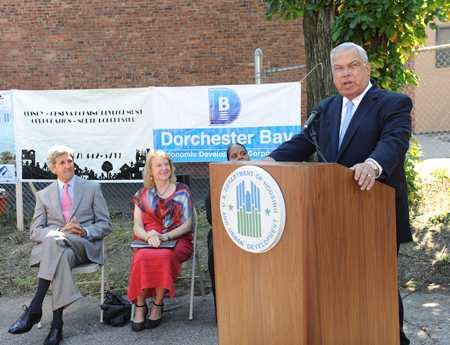On September 1st, 2011 the U.S. Department of Housing & Urban Development announced that it will allocate one of five Choice Neighborhoods Initiative grants to the redevelopment of the Dorchester Quincy Street Corridor, as well as the Woodledge/Morrant Bay Apartments. Implemented for the first time this year, Choice Neighborhoods Initiative grants are awarded to five struggling neighborhoods nationwide. This year, the cities of New Orleans, Seattle, Chicago, San Francisco, and Boston were awarded grants, equating a total $122 Million in redevelopment funding.
The City of Boston was allocated $18.45 Million for redevelopment:
$12.3 million will assist the redevelopment of the distressed Woodledge/Morrant Bay HUD-assisted housing development. Additionally, $3.075 million will be used for community improvements such as community facilities, parks, gardens, economic development, job creation and asset building. The remaining $3.075 million will be used for supportive services for residents of Quincy Heights and the surrounding Quincy Street corridor. [www.cityofboston.gov]
(Above: Mayor Thomas Menino, Senator John Kerry, and Director of the DBEDC Jeanne DuBois accept the Choice Neighborhoods Initiative grant on behalf of the City of Boston)
The grant is intended to promote mixed-income neighborhoods by emphasizing the need for affordable housing, public services, quality schools, and access to transportation and jobs. The development includes both housing and job center components. 129 local families will benefit from the rehabilitation and reconstruction of 80 apartments, as well as the construction of a new 49 units.
Furthermore, the development hopes to create two job centers that will stimulate the area with new employment opportunities. In the earliest stages of the proposal, ABG Realty advised the Dorchester Bay Economic Development Center on how to best utilize the commercial space available. By redeveloping the old Pearl Meats Processing Plant, developers hope to provide a functional space for anywhere between 30-40 businesses to open shop. Traditionally, a space the size of the Pearl Meats’ is inadequate to house so many small businesses. However, together ABG Realty and the DBEDC created a unique communal business environment that can accommodate more commercial tenants. This communal environment includes shared kitchen spaces, as well as shared dinning facilities.
The second job center (usage unspecified) is conveniently located near a railway which the executive director of DBEDC Jeanne DuBois foresees as being an asset to the development of a industrial job center.
Contact: dfayngor@abgrealty.net


